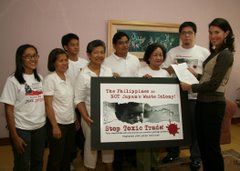27 August 2008, Pasay, City – In a forum organized by the multi-sectoral group Magkaisa Junk JPEPA Coalition (MJJC) entitled, "JPEPA Losers and Gainers: Constitutional and Trade Issues", two experts provided a bruising critique of the controversial Japan-Philippines Economic Partnership Agreement (JPEPA) before members of the press, civil society and Senate staff.
Constitutional, international law expert and former dean of the UP College of Law, Prof. Merlin Magallona, and former commercial attaché and former director of the Department of Trade and Industry Bureau of International Trade Relations, Ms. Edna Espos weighed the constitutional and trade issues facing the JPEPA, and gave the treaty a thumbs down, concluding that the JPEPA will make the Philippines and the Filipinos big losers to Japan.
Unconstitutionality of JPEPA“JPEPA is an essential aspect of the Japanese relocation strategy and JPEPA’s benefits will be accruing to the Japanese subsidiaries in the Philippines,” explained Magallona.
In his analysis, Magallona dissects how the JPEPA by granting extensive national treatment principle gives away to the Japanese sacred Constitutional rights reserved for Filipinos, such as to own land in the Philippines, the right practice certain professions, operate and administer educational institutions. This essentially places Japanese nationals and their investments at parity with Filipinos.

According to Magallona, if very little preference is extended to the Filipino vis-à-vis the Japanese investors under the JPEPA, what is the value of being a Filipino in your own national economy?
On the issue of the pending exchange of notes that Sen. Miriam Defensor-Santiago claims will address the Constitutional issues in JPEPA, Magallona was cautious; elaborating that without the benefit of seeing the actual document it would be very difficult to come up with a definitive analysis favorable or otherwise..
He raised concerns, however, on the impact of the notes on the JPEPA if it is executed merely between the Philippine and Japanese Executive branches, noting that the JPEPA was ratified by the Japanese Diet and is pending concurrence by the Philippine Senate. Any amendment to the agreement entered into by the Philippines with Japan should at least go through a similar process, at a minimum.
Failed Trade Objectives“Sen. Roxas’ established two tests to gauge the success of JPEPA: first, did we achieve our negotiating objectives, and second, did we gain more than we gave up. The answer to these tests is a resounding no,” exclaimed Espos at the start of her critique on the trade value of JPEPA to the Philippines.
One of the goals for entering into JPEPA, according to Espos, is to gain market access for Philippine exports to Japan. In order to achieve this goal the Philippines under JPEPA drastically eliminated tariffs across the board, exempting only 6 tariff lines for rice and salt and negotiated on issues that it would not even do so under the World Trade Organization.
Instead of reciprocating the gesture, Japan on the other hand, excluded from the coverage of JPEPA at least 197 tariff lines, constituting mainly agricultural and marine products for which the Philippines has competitive advantage. The long list of Japanese exclusions, long-term phase out of tariffs, and deferred market negotiations under JPEPA severely restricted agricultural gains by the Philippines under JPEPA.
Espos further explained that the purported easier market access for electronics, furnitures, and automotive parts under JPEPA is not entirely true. Even without the JPEPA, these products already enter Japan duty-free; JPEPA did not change anything. Philippine garments and footwear exporters cannot take advantage of the duty-free provision under JPEPA because their raw materials do not comply with JPEPA Rules of Origin (ROO), which mandates in part that the raw materials come primarily from Japan or any of the ASEAN countries.
A crucial item that the Philippines failed to get after giving up so much was the removal of the enormous Japanese agricultural subsidy (including subsidies on fishing industry) that aversely affects millions of Filipino farmers and fisherfolks who cannot compete with subsidized products both abroad and at home.
Espos elaborated on the inequity of the JPEPA, by citing that the Philippines eliminated its fish tariffs under JPEPA, but Japan will not even commit to reduce its subsidies on its fishing vessels and will in fact even exclude fish products from the JPEPA.
“We gave up everything, and gained nothing under JPEPA. This is the sorry conclusion facing us with JPEPA,” stated Atty. Golda Benjamin, lead counsel for MJJC. “For a treaty that is so patently unconstitutional and for its failure to obtain the needed gains for Filipino farmers, fisherfolks, workers and exporters, there is only one logical, just, and moral step that the Senate can take, and that is to reject JPEPA.”







